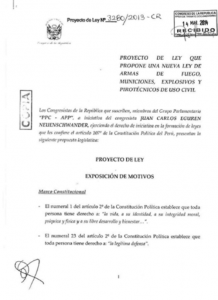Anti-gun rights and anti-hunting groups from the US and abroad are very active in Central and South America, with the intent to outflank and overrun US gunowners from that direction. But a fledgling movement to fight the complete eradication of hunting and civilian gun ownership in the Southern Hemisphere has succeeded in introducing legislation in Peru to instead expand the rights of owners under a draconian gun control system.
“We achieved a landmark … when a Peruvian congressman introduced a bill favoring the position of the firearms community,” said J. Thomas Saldias, coordinator of the Coalicion por un Peru Libre de Armas ILEGALES (Coalition for a Peru Free of ILLEGAL Firearms). “The bill is significant because it’s the first bill in the region that favors the position of shooters and hunters.”
The bill is a beginning on a very long road to secure some firearms rights that gunowners in the US will find familiar, and some they would consider restrictive and invasive; but in Latin American countries like Peru, where ownership is strictly controlled and limited to only four firearms per person, any inroad at all is a positive step. The bill now before the Peruvian Congress stipulates the establishment of:
• A national registry of convicted felons, with the purpose of denying them possession of firearms, similar to the NICS check in the US;
• Mandatory training for all gunowners, both in firearms handling and in current laws;
• Using the US ATF definition of “antique” and “collectible,” and removing the current requirement that such firearms be de-milled by drilling the chambers;
• A registration card for each firearm with no expiration date;
• A CCW permit, and
• Requiring military members to register their personal firearms with the same government agency as civilians, rather than with their military branch.
Peru is not alone. Other Latin Americans are trying to rally against an organized and methodical assault on gunownership orchestrated by Oxfam International, International Action Network on Small Arms (IANSA), Open Society, the Latin American Parliament (Parliamentary Forum on Small Arms) and the Latin American Coalition for the Prevention of Gun Violence (CLAVE).
“Even some governments, such as the governments of Belgium, UK, Australia, Norway and Sweden have been very proactive in promoting coercive measures in our region,” Saldias said.
According to Saldias, finances for these antirights and antihunting forces also stream from North American sources, such as: the Rockefeller Foundation; Compton Foundation; John and Catherine McArthur Foundation; Samuel Rubin Foundation, and the Ploughshares Fund.
Saldias said Small Arms Control, with more than 100 member organizations operating offices in 120 countries, is the most active anti-rights group in Mexico. “It is led by Rebecca Peters, an Australian native who moved to New York,” Saldias said. “She is directly funded by [anti-rights billionaire] George Soros.”
Foreign anti-rights influences are so powerful in Latin America that the Coalition had been working since May 2013 to get backing for their bill in the Peruvian Congress. The Coalition finally got in the door of Congressman Juan Carlos Eguren last November and Eguren introduced the bill Mar. 14.
Seeing the bill pass as written may be too much to expect, but its introduction alone is a victory. “The most important thing about this bill is that it reverses a trend that has been always restrictive and confiscatory,” Saldias said.




